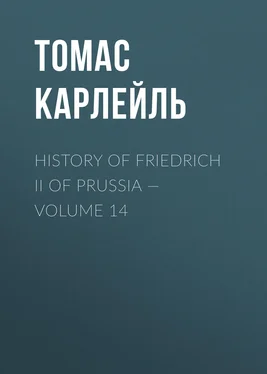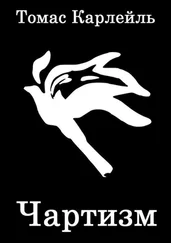Томас Карлейль - History of Friedrich II of Prussia — Volume 14
Здесь есть возможность читать онлайн «Томас Карлейль - History of Friedrich II of Prussia — Volume 14» — ознакомительный отрывок электронной книги совершенно бесплатно, а после прочтения отрывка купить полную версию. В некоторых случаях можно слушать аудио, скачать через торрент в формате fb2 и присутствует краткое содержание. Жанр: foreign_prose, История, literature_19, foreign_edu, foreign_antique, на английском языке. Описание произведения, (предисловие) а так же отзывы посетителей доступны на портале библиотеки ЛибКат.
- Название:History of Friedrich II of Prussia — Volume 14
- Автор:
- Жанр:
- Год:неизвестен
- ISBN:нет данных
- Рейтинг книги:5 / 5. Голосов: 1
-
Избранное:Добавить в избранное
- Отзывы:
-
Ваша оценка:
- 100
- 1
- 2
- 3
- 4
- 5
History of Friedrich II of Prussia — Volume 14: краткое содержание, описание и аннотация
Предлагаем к чтению аннотацию, описание, краткое содержание или предисловие (зависит от того, что написал сам автор книги «History of Friedrich II of Prussia — Volume 14»). Если вы не нашли необходимую информацию о книге — напишите в комментариях, мы постараемся отыскать её.
History of Friedrich II of Prussia — Volume 14 — читать онлайн ознакомительный отрывок
Ниже представлен текст книги, разбитый по страницам. Система сохранения места последней прочитанной страницы, позволяет с удобством читать онлайн бесплатно книгу «History of Friedrich II of Prussia — Volume 14», без необходимости каждый раз заново искать на чём Вы остановились. Поставьте закладку, и сможете в любой момент перейти на страницу, на которой закончили чтение.
Интервал:
Закладка:
"The flower of the young Nobility had marched in that Oriflamme;—now standing at bay, they and it, in Prag yonder: French honor itself seems shut up there! The thought of it agitates bitterly the days and nights of old Fleury, who is towards ninety now, and always disliked war. The French public too,—we can fancy what a public! The young Nobility in Prag has its spokes-men, and spokes-women, at Versailles, whose complaint waxes louder, shriller; the whole world, excited by rumor of those furious sallies, is getting shrill and loud. What can old Fleury do but order Maillebois: 'Leave Dunkirk to its own luck; march immediately for relief of Prag!' And Maillebois is already on march; his various divisions (August 9th-20th) crossing the Rhine, in Dusseldorf Country;"—of whom we shall hear.
"Some time before the actual Bombardment, Fleury, seeing it inevitable, had ordered Belleisle to treat. Belleisle accordingly had an interview, almost two interviews, with Konigseck. [ Guerre de Boheme , ii. 156 ("2d July" the actual interview); ib. 161 (the corollary to it, confirmatory of it, which passed by letters).] 'Liberty to march home, and equitable Peace-Negotiations in the rear?' proposed Belleisle. 'Absolute surrender; Prisoners of War!' answered Konigseck; 'such is her Hungarian Majesty's positive order and ultimatum.' The high Belleisle responded nothing unpolite; merely some, 'ALORS, MONSIEUR—!' And rode back to Prag, with a spirit all in white heat;—gradually heating all the 24,000 white, and keeping them so.
"In fact, Belleisle, a high-flown lion reduced to silence and now standing at bay, much distinguishes himself in this Siege; which, for his sake, is still worth a moment's memory from mankind. He gathers himself into iron stoicism, into concentration of endeavor; suffers all things, Broglio's domineering in the first place; as if his own thin skin were that of a rhinoceros; and is prepared to dare all things. Like an excellent soldier, like an excellent citizen. He contrives, arranges; leads, covertly drives the domineering Broglio, by rule of contraries or otherwise, according to the nature of the beast; animates all men by his laconic words; by his silences, which are still more emphatic.... Sechelles, provident of the future, has laid in immense supplies of indifferent biscuit; beef was not attainable: Belleisle dismounts his 4,000 cavalry, all but 400 dragoons; slaughters 160 horses per day, and boils the same by way of butcher's-meat, to keep the soldier in heart. It is his own fare, and Broglio's, to serve as example. At Broglio's quarter, there is a kind of ordinary of horse-flesh: Officers come in, silent speed looking through their eyes; cut a morsel of the boiled provender, break a bad biscuit, pour one glass of indifferent wine; and eat, hardly sitting the while, in such haste to be at the ramparts again. The 80,000 Townsfolk, except some Jews, are against them to a man. Belleisle cares for everything: there is strict charge on his soldiers to observe discipline, observe civility to the Townsfolk; there is occasional 'hanging of a Prag Butcher' or so, convicted of spyship, but the minimum of that, we will hope."
MAILLEBOIS MARCHES, WITH AN "ARMY OF REDEMPTION" OR "OF MATHURINS" (WITTILY SO CALLED), TO RELIEVE PRAG; REACHES THE BOHEMIAN FRONTIER, JOINED BY THE COMTE DE SAXE; ABOVE 50,000 STRONG (August 9th-September 19th)
Maillebois has some 40,000 men: ahead of him 600 miles of difficult way; rainy season come, days shortening; uncertain staff of bread ("Seckendorf's meal," and what other commissariat there may be): a difficult march, to Amberg Country and the top of the Ober-Pfalz. After which are Mountain-passes; Bohemian Forest: and the Event—? "Cannot be dubious!" thinks France, whatever Maillebois think. Witty Paris, loving its timely joke, calls him Army of Redemption, "L'ARMEE DES MATHURINS,"—a kind of Priests, whose business is commonly in Barbary, about Christian bondage:—how sprightly! And yet the enthusiasm was great: young Princes of the Blood longing to be off as volunteers, needing strict prohibition by the King;—upon which, Prince de Conti, gallant young fellow, leaving his wife, his mistress, and miraculously borrowing 2,500 pounds for equipments, rushed off furtively by post; and did join, and do his best. Was reprimanded, clapt in arrest for three days; but afterwards promoted; and came to some distinction in these Wars. [Barbier, ii. 326 (that of Conti, ib. 331); Adelung, &c.]
The March goes continually southeast; by Frankfurt, thence towards Nurnberg Country ("be at Furth, September 6th"), and the skirts of the Pine-Mountains (FICHTEL-GEBIRGE),—Anspach and Baireuth well to your left;—end, lastly, in the OBER-PFALZ (Upper Palatinate), Town of Amberg there. Before trying the Bohemian Passes, you shall have reinforcement. Best part of the "Bavarian Army," now under Comte de Saxe, not under D'Harcourt farther, is to cease collecting victual in the Donau-Iser Countries (Deggendorf, north bank of Donau, its head-quarter); and to get on march,—circling very wide, not northward, but by the Donan, and even by the SOUTH, bank of it mainly (to avoid the hungry Mountains and their Tolpatcheries),—and, at Amberg, is to join Maillebois. This is a wide-lying game.
The great Marlborough used to play such, and win; making the wide elements, the times and the spaces, hit with exactitude: but a Maillebois?"He is called by the Parisians, 'VIEUX PETIT-MAITRE (dandy of sixty,' so to speak); has a poor upturned nose, with baboon-face to match, which he even helps by paint."... Here is one Scene; at Frankfurt-on-Mayn; fact certain, day not given.
FRANKFURT, "LATTER END OF AUGUST," 1742. "At Frankfurt, his Army having got into the neighborhood,"—not into Frankfurt itself, which, as a REICHS-STADT, is sacred from Armies and their marchings,—"Marechal de Maillebois, as in duty bound, waited on the Kaiser to pay his compliments there: on which occasion, we regret to say, Marechal de Maillebois was not so reverent to the Imperial Majesty as he should have been. Angry belike at the Adventure now forced on him, and harassed with many things; seeing in the Imperial Majesty little but an unfortunate Play-actor Majesty, who lives in furnished lodgings paid for by France, and gives France and Maillebois an infinite deal of trouble to little purpose. Certain it is, he addressed the Imperial Majesty in the most free-and-easy manner; very much the reverse of being dashed by the sacred Presence: and his Officers in the ante-chamber, crowding about, all day, for presentation to the Imperial Majesty, made a noise, and kept up a babble of talk and laughter, as if it had been a mess-room, instead of the Forecourt of Imperial Majesty. So that Imperial Majesty, barely master of its temper and able to finish without explosion, signified to Maillebois on the morrow, That henceforth it would dispense with such visits, Poor Imperial Majesty; a human creature doing Play-actorisms of too high a flight. He had the finest Palace in Germany; a wonder to the Great Gustavus long ago: and now he has it not; mere Meutzels and horrent shaggy creatures rule in Munchen and it: and the Imperial quasi-furnished lodgings are respected in this manner!" [Van Loon, Kleine Schriften, ii. 271 (cited in Buchholz, ii. 71). CAMPAGNES is silent; usually suppressing scenes of that kind.]—The wits say of him, "He would be Kaiser or Nothing: see you, he is Kaiser and Nothing!" [ "Aut nihil aut Caesar, Bavarus Dux esse volebat; Et nihil et Caesar factus utrumque simul." (Barbier, ii. 322.)]...
AUGUST 19th-SEPTEMBER 14th. "Comte de Saxe is on march, from Deggendorf; north bank of the Donau, by narrow mountain roads; then crosses the Donau to south bank, and a plain country;—making large circuit, keeping the River on his right,—to meet Maillebois at Amberg; his force, some 10 or 12,000 men. Seckendorf, now Bavarian Commander-in-chief, accompanies Saxe; with considerable Bavarian force, guess 20,000, 'marching always on the left.' Accompanies; but only to Regensburg, to Stadt-am-Hof, a Suburb of Regensburg, where they cross the Donau again."—SUBURB of Regensburg, mark that; Regensburg itself being a Reichs-Stadt, very particularly sacred from War;—the very Reichs-DIET commonly sitting here; though it has gone to Frankfurt lately, to be with its Kaiser, and out of these continual trumpetings and tumults close by. [Went 10th May, 1742,—after three months' arguing and protesting on the Austrian part (Adelung, iii. A, 102, 138).]—"At Regensburg, once across, Seckendorf with his Bavarians calls halt; plants himself down in Kelheim, Ingolstadt, and the safe Garrisons thereabouts,—calculates that, if Khevenhuller should be called away Prag-ward, there may be a stroke do-able in these parts. Saxe marches on; straight northward now, up the Valley of the Naab; obliged to be a good deal on his guard. Mischievous Tolpatcheries and Trencks, ever since he crossed the Donau again, have escorted him, to right, as close as they durst; dashing out sometimes on the magazines." One of the exploits they had done, take only one:—in their road TOWARDS Saxe, a few days ago:—
Читать дальшеИнтервал:
Закладка:
Похожие книги на «History of Friedrich II of Prussia — Volume 14»
Представляем Вашему вниманию похожие книги на «History of Friedrich II of Prussia — Volume 14» списком для выбора. Мы отобрали схожую по названию и смыслу литературу в надежде предоставить читателям больше вариантов отыскать новые, интересные, ещё непрочитанные произведения.
Обсуждение, отзывы о книге «History of Friedrich II of Prussia — Volume 14» и просто собственные мнения читателей. Оставьте ваши комментарии, напишите, что Вы думаете о произведении, его смысле или главных героях. Укажите что конкретно понравилось, а что нет, и почему Вы так считаете.









